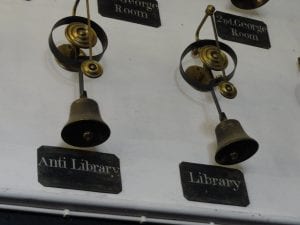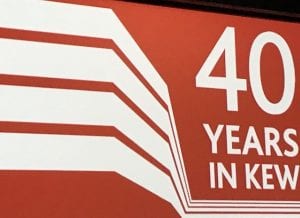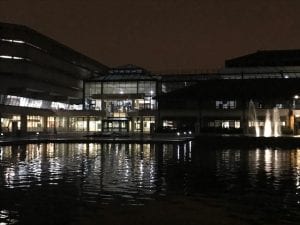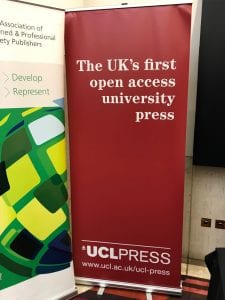Pro-Vice-Provost’s View
By Paul Ayris, on 22 May 2018
UCL Press celebrates 1 million downloads
21 May 2018 was a very special day for UCL Press, because this is when we officially celebrated 1 million downloads of our research monographs, textbooks and journals.
The Press  was founded in 2015 and has now been in production for 3 years. It is a tremendous achievement to have reached the magical figure of 1 million downloads so quickly. Initially, I thought that it would be a result if we achieved 10,000 downloads any time soon. How wrong can you be? The festive party for UCL Press was attended by senior members of the university, UCL academics, our authors, UCL students, and honoured guests. It was held in the North Cloisters on a sunny, warm Spring evening.
was founded in 2015 and has now been in production for 3 years. It is a tremendous achievement to have reached the magical figure of 1 million downloads so quickly. Initially, I thought that it would be a result if we achieved 10,000 downloads any time soon. How wrong can you be? The festive party for UCL Press was attended by senior members of the university, UCL academics, our authors, UCL students, and honoured guests. It was held in the North Cloisters on a sunny, warm Spring evening.
There were three speakers at the event. Professor David Price, Vice-Provost (Research), congratulated the Press on achieving its remarkable impact figures and pointed out that UCL Press titles were now downloaded in 222 countries and territories. This includes North Korea, where UCL Press titles even there have been downloaded 15 times.
The second speaker was Georgina Brewis. Georgina has just revised The World of UCL, which is UCL’s institutional history.
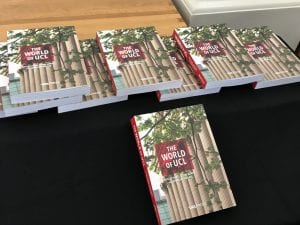 As Georgina explained, she did more than add an extra chapter to bring the history up to date. She rigorously pruned the number of images in the book, many of which are from UCL Special Collections, and ensured that UCL’s commitment to equality and diversity are reflected in the earlier materials in the book. Beautifully designed and produced, the new institutional history of UCL is a worthy addition to the UCL Press stable.
As Georgina explained, she did more than add an extra chapter to bring the history up to date. She rigorously pruned the number of images in the book, many of which are from UCL Special Collections, and ensured that UCL’s commitment to equality and diversity are reflected in the earlier materials in the book. Beautifully designed and produced, the new institutional history of UCL is a worthy addition to the UCL Press stable.
Finally, I was able to complete the trio of speeches with a few words of my own.
 At the present rate of download (90,000 per month), we will reach 2 million downloads this time next year. So, certainly time for another party. I also recounted a story about the European Commission, who were represented at the latest meeting of LERU Rectors. On Saturday, I was present with the Provost in Edinburgh to seek acceptance by the 23 Rectors of LERU (League of European Research Universities) of the new LERU Roadmap for Open Science. Lessons from UCL Press figure largely in this Roadmap. Open Access publishing performed by an institutional Press has the power to transform the way research outputs are stored, disseminated and used by all those in Society with an enquiring mind.
At the present rate of download (90,000 per month), we will reach 2 million downloads this time next year. So, certainly time for another party. I also recounted a story about the European Commission, who were represented at the latest meeting of LERU Rectors. On Saturday, I was present with the Provost in Edinburgh to seek acceptance by the 23 Rectors of LERU (League of European Research Universities) of the new LERU Roadmap for Open Science. Lessons from UCL Press figure largely in this Roadmap. Open Access publishing performed by an institutional Press has the power to transform the way research outputs are stored, disseminated and used by all those in Society with an enquiring mind.
So congratulations to UCL Press colleagues, to our authors and to everyone in UCL who helps to make the Press such a fantastic success. Let’s look to the next 1 million downloads, coming your way soon…
Paul Ayris
Pro-Vice-Provost (UCL Library Services)
 Close
Close


